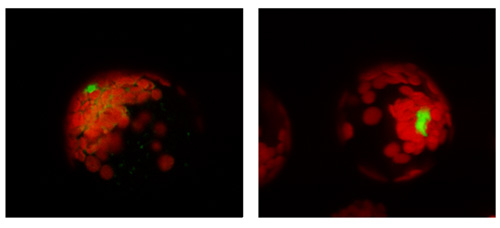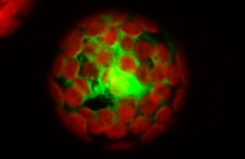News
New enzymatic redox activity uncovered in plant cells
The Spoel Research Group has discovered a new enzymatic redox activity in plant cells that regulates responses to invading pathogens. The enzyme Thioredoxin-h5 is shown to regulate protein modifications made my nitric oxide, a small signalling molecule in both plants and animals. Their findings were published this week in the journal MOLECULAR CELL.
Edinburgh, September 4, 2014 - Plants and animals are continuously exposed to a large variety of aggressive pathogens. To defend themselves both have evolved sophisticated mechanisms to deter pathogens. Upon pathogen attack, many cells produce numerous oxidative molecules, such as nitric oxide, that not only generate an unpleasant environment for the pathogen, they also fulfil important signalling functions in the host's immune system by modifying immune proteins.
Despite much research on the role of nitric oxide in the plant immune system, it remained unclear how protein modifications by nitric oxide are kept in check to optimize effective immune responses. The Spoel Research Group now shows that the evolutionary conserved redox enzyme, Thioredoxin-h5 (TRXh5) is capable of removing nitric oxide from immune proteins. Their findings are published this week in the international journal Molecular Cell.

By removing nitric oxide modifications TRXh5 causes enrichment of a fluorescently labelled immune activator in the plant cell nucleus.
First author and PhD student Sophie Kneeshaw says “What really astonished us was that TRXh5 does not remove nitric oxide indiscriminately, but does so in a very selective manner. This provides an important level of specificity to signalling within the plant immune system that previously we were unaware of.”
Lead author Dr. Steven Spoel indicates that “…elucidating this new enzymatic activity has important consequences for our understanding of the plant immune system. It demonstrates for the first time that nitric oxide signalling consists not of one, but several branches that selectively regulate different parts of the plant immune system. These findings are particularly important to take into account in the design of novel crop protection strategies.”
The University of Edinburgh’s research team was funded by the Royal Society.
External links
Kneeshaw S, Gelineau S, Tada Y, Loake GJ, Spoel SH (2014) Selective protein denitrosylase activity of Thioredoxin-h5 modulates plant immunity. MOLECULAR CELL, in press.
doi:10.1016/j.molcel.2014.08.003
School of Biological Sciences News, University of Edinburgh
IMPS News, University of Edinburgh

